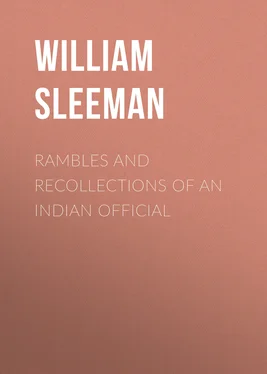William Sleeman - Rambles and Recollections of an Indian Official
Здесь есть возможность читать онлайн «William Sleeman - Rambles and Recollections of an Indian Official» — ознакомительный отрывок электронной книги совершенно бесплатно, а после прочтения отрывка купить полную версию. В некоторых случаях можно слушать аудио, скачать через торрент в формате fb2 и присутствует краткое содержание. Жанр: Путешествия и география, История, foreign_edu, foreign_antique, foreign_prose, на английском языке. Описание произведения, (предисловие) а так же отзывы посетителей доступны на портале библиотеки ЛибКат.
- Название:Rambles and Recollections of an Indian Official
- Автор:
- Жанр:
- Год:неизвестен
- ISBN:нет данных
- Рейтинг книги:4 / 5. Голосов: 1
-
Избранное:Добавить в избранное
- Отзывы:
-
Ваша оценка:
- 80
- 1
- 2
- 3
- 4
- 5
Rambles and Recollections of an Indian Official: краткое содержание, описание и аннотация
Предлагаем к чтению аннотацию, описание, краткое содержание или предисловие (зависит от того, что написал сам автор книги «Rambles and Recollections of an Indian Official»). Если вы не нашли необходимую информацию о книге — напишите в комментариях, мы постараемся отыскать её.
Rambles and Recollections of an Indian Official — читать онлайн ознакомительный отрывок
Ниже представлен текст книги, разбитый по страницам. Система сохранения места последней прочитанной страницы, позволяет с удобством читать онлайн бесплатно книгу «Rambles and Recollections of an Indian Official», без необходимости каждый раз заново искать на чём Вы остановились. Поставьте закладку, и сможете в любой момент перейти на страницу, на которой закончили чтение.
Интервал:
Закладка:
136
The Permanent Settlement of Bengal, effected under the orders of Lord Cornwallis in 1793, was soon afterwards extended to the province of Benares, now included in the United Provinces of Agra and Oudh. Illusory provisions were made to protect the rights of tenants, but nothing at all effectual was done till the passing of Act x of 1859, which has been largely modified by later legislation.
137
The general principle here stated of respect for personal substantive law in civil matters is still the guide of the Indian Legislature, but the accumulation of Privy Council and High Court rulings, combined with the action of codes, has effected considerable gradual change. Direct legislation has anglicized the law of contract, and has modified, though not so largely, the law of marriage, inheritance, and succession.
138
In the author's time the courts of the East India Company still followed the Muhammadan criminal law, as modified by the Regulations. The Indian Penal Code of 1869 placed the substantive criminal law on a thoroughly scientific basis. This code was framed with such masterly skill that to this day it has needed little material amendment. The first Criminal Procedure Code, passed in 1861, has been twice recast. The law of evidence was codified by Sir James FitzJames Stephen in the Indian Evidence Act of 1870.
139
This proposition, in the editor's opinion, truly states the theory of land tenures in India, and it was a generally accurate statement of actual fact in the author's time. Since then the long continuance of settled government, by fostering the growth of private rights, has tended to obscure the idea of state ownership. The modern revenue codes, instead of postulating the ownership of the state, enact that the claims of the state—that is to say, the land- revenue—are the first charge on the land and its produce. The Malabar coast offers an exception to the general Hindu role of state ownership of land. The Nairs, Coorgs, and Tulus enjoyed full proprietary rights (Dubois, Hindu Manners, &c ., 3rd edition (1906), p. 57).
140
Amīr Khān, the Nawāb of Tonk, assigned to his physician, who had cured him of an intermittent fever, lands yielding one thousand rupees a year, in rent-free tenure, and gave him a deed signed by himself and his heir-apparent, declaring expressly that it should descend to him and his heir for ever. He died lately, and his son and successor, who had signed the deed, resumed the estate without ceremony. On being remonstrated with, he said that 'his father, while living, was, of course, master, and could make him sign what he pleased, and give land rent-free to whom he pleased; but his successor must now be considered the best judge whether they could be spared or not; that if lands were to be alienated in perpetuity by every reigning Nawāb for every dose of medicine or dose of prayers that he or the members of his family required, none would soon be left for the payment of the soldiers, or other necessary public servants of any description'. This was told me by the son of the old physician, who was the person to whom the speech was made, his father having died before Amīr Khān. [W. H. S.] Amīr Khān was the famous Pindhārī leader. H. T. Prinsep translated his Memoirs from the Persian of Busawun Lāl (Calcutta, 1832).
141
The ancient deeds of grant, engraved on copper, of which so many have been published within the last hundred years, almost invariably conclude with fearful curses on the head of any rash mortal who may dare to revoke the grant. Usually the pious hope is expressed that, if he should be guilty of such wickedness, he may rot in filth, and be reborn a worm.
142
Revenue officers commonly observe that revenue-free grants, which the author calls rent-free, are often ill cultivated. The simple reason is that the stimulus of the collector's demand is wanting to make the owner exert himself.
143
These leases now carry with them a right of ownership, involving the power of alienation, subject to the lien of the land revenue as a first charge. Conversely, the modern codes lay down the principle that the revenue settlement must be made with the proprietor. The author's rule of agricultural succession by primogeniture in the Nerbudda territories has survived only in certain districts (see post , Chapter 47). The land-revenue law and the law concerning the relations between landlords and tenants have now been more or less successfully codified in each province. Mr. B. H. Baden-Powell's encyclopaedic work The Land Systems of British India (3 volumes: Oxford, Clarendon Press, 1892) gives very full information concerning Indian tenures as now existing, and the law applicable to them at the date of publication.
144
Ante , Chapter 9.
145
An orderly, or official messenger, who wears a 'chaprās', or badge of office.
146
On the Nerbudda, fifty miles south-east of Jubbulpore.
147
Of the supposed powers and dispositions of witches among the Romans we have horrible pictures in the 5th Ode of the 6th Book of Horace, and in the 6th Book of Lucan's Pharsalia . [W. H. S.] The reference to Horace should be to the 5th Epode. The passage in the Pharsalia , Book VI, lines 420-830, describes the proceedings of Thessalian witches.
148
Such awkward incidents of medical practice are not heard of nowadays.
149
The population of Jabalpur (including cantonments) has increased steadily, and in 1911 was 100,651, as compared with 84,556 in 1891, and 76,023 in 1881.
150
Katāk, or Cuttack, a district, with town of same name, in Orissa.
151
In the Bilāspur district of the Central Provinces. The distance in a direct line between Mandlā and Katāk is about 400 miles.
152
Shāhgarh was formerly a petty native state, with town of same name. The chief joined the rebels in 1857, with the result that his dominions were confiscated, and distributed between the districts of Sāgar and Damoh in the Central Provinces, and Jhānsī (formerly Lalitpur) in the United Provinces of Agra and Oudh. The town of Shāhgarh is in the Sāgar district.
153
Rāipur is the chief town of the district of the same name in the Central Provinces, which was not finally annexed to the British dominions until 1854, when the Nāgpur State lapsed.
154
Afterwards Captain H. A. Sleeman, He died in 1905.
155
Of Garhā, see ante , Chapter 9, prior to note 10.
156
The real 'kalpa', which now stands in the garden of the god Indra in the first heaven, was one of the fourteen varieties found at the churning of the ocean by the gods and demons. It fell to the share of Indra. [W. H. S.] The tree referred to in the text perhaps may be the Erythrina arborescens , or coral-tree, which sheds its leaves after the hot weather.
157
That is to say, orderlies, or 'chaprāsīs'.
158
Every Hindoo is thoroughly convinced that the names of Rām and his consort Sītā are written on this tree by the hand of God, and nine-tenths of the Musalmāns believe the same.
Happy the man who sees a God employed
In all the good and ill that chequer life,
Resolving all events, with their effects
And manifold results, into the will
And arbitration wise of the Supreme.
Интервал:
Закладка:
Похожие книги на «Rambles and Recollections of an Indian Official»
Представляем Вашему вниманию похожие книги на «Rambles and Recollections of an Indian Official» списком для выбора. Мы отобрали схожую по названию и смыслу литературу в надежде предоставить читателям больше вариантов отыскать новые, интересные, ещё непрочитанные произведения.
Обсуждение, отзывы о книге «Rambles and Recollections of an Indian Official» и просто собственные мнения читателей. Оставьте ваши комментарии, напишите, что Вы думаете о произведении, его смысле или главных героях. Укажите что конкретно понравилось, а что нет, и почему Вы так считаете.












